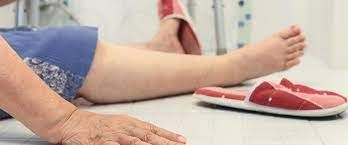Seniors and Fall Risk

As we age, our fall risk increases. There are many factors that contribute to this fact, and most are age-related. Muscle weakness and balance problems are the leading factors relating to fall risks in seniors. It can also be caused by blurred vision, dizziness, or some medications. Even being afraid of falling can increase your fall risk. We’ll talk about some age-related fall risks and possible ways to avoid them.
My mother is 95 years old and has poor eyesight. She has tripped and fallen over bright yellow painted curb stops twice; luckily, she hasn’t seriously hurt herself, but now she is afraid to leave the house. When I take her somewhere she always gets angry at me because I am always holding her by her arm and making sure she is walking safely. I just tell her she’s not falling on my watch! It must be so scary to feel this way.
Reasons for fall risk:
As we age, our muscles lose strength, and our bones get weaker. This means our muscle mass is not as dense as it used to be so we can fall easier. Also, our bones are weaker so they may have a harder time holding our bodies upright.
We tend to get a weaker sense of balance as we get older. Changes on our body and some medication side effects can make it difficult to stay balanced and steady on our feet.
As our vision worsens so does our balance and our ability to avoid obstacles. The ability to stand upright and see what’s in our path is lessened as well as we tend to look down to avoid tripping over things.
Age also makes our hips and ankles less flexible which increases our fall risk. This is why it’s so important to exercise. Walking is one of the best exercises for seniors to improve their balance, strength, and flexibility, but you must ensure you are able to walk safely.
Ways to reduce fall risk:
You can make your home safer by decluttering the main areas, especially walkways, making sure there are no throw rugs, this is one of the main fall risks in most homes. If you can’t see well, improve the lighting, open the blinds, or buy more lights. Making simple safety updates in the home is easy and can prevent a major health disaster.
Safe, regular exercise to build strength, balance, and flexibility is the key to reducing your fall risk. There are many chair exercises now that can help build the strength in your legs so you can progress to standing exercises after doing those.
Have your vision checked regularly and treat any problems. Early detection of eye problems can prevent a serious condition from forming.
Make sure any canes or walkers you use fit properly for your stance. Having to bend over to hold a cane or walk with a walker will only hurt your back and cause more issues down the road. Have your doctor or physical therapist fit it to suit your body type.
Also, make sure you wear comfortable, supportive shoes and slippers with non-slip soles. Don’t wear any shoes or slippers that are too big or too small. Make sure they fit properly as well.
So, as we age our fall risk increases from several factors. We can help prevent our fall risk with some simple, easy steps and keep ourselves out of the hospital and our bones from breaking. Please ensure you take caution. You can seriously injure yourself from a fall and the older we get, the harder it is to bounce back.



